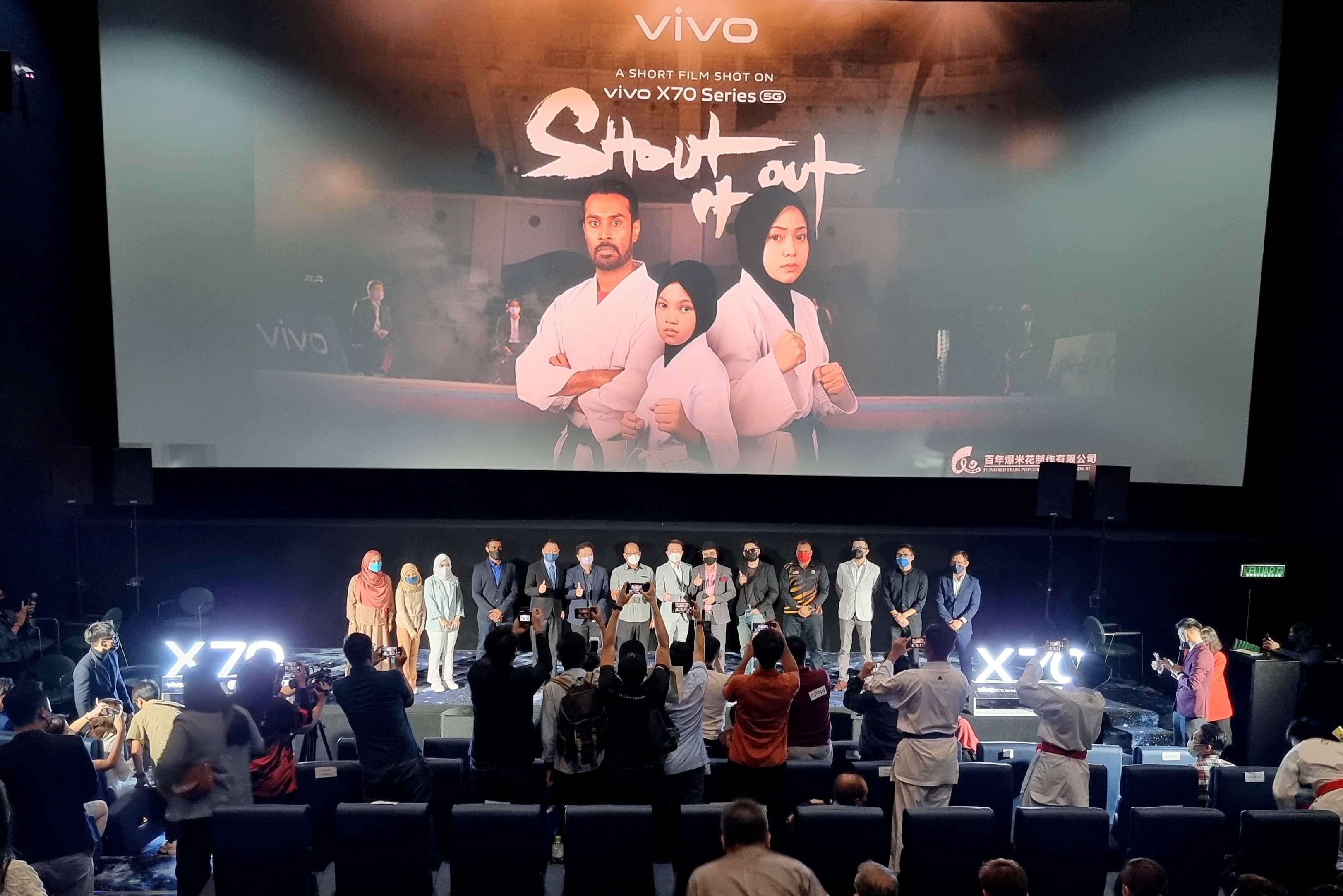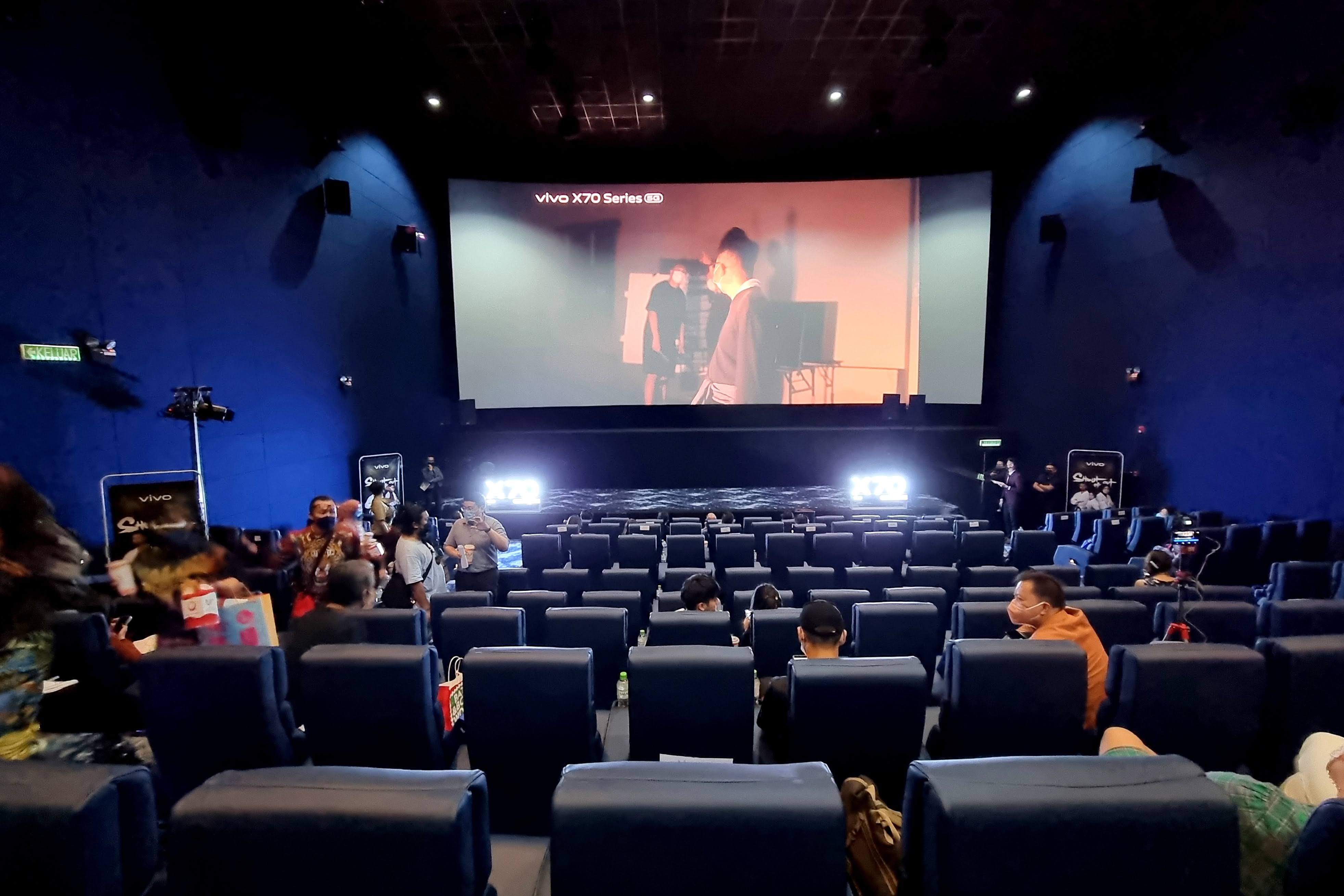Vivo Malaysia has recently launched a short film titled "SHOUT IT OUT" which was filmed entirely on their X70 Pro smartphone. I was invited to attend the film premier at DADI Cinema in Pavilion, KL, so I took this opportunity to vlog the entire event, sharing with you what I experienced and also some thoughts on using smartphone for film-making, you can find my vlog here (click). In this blog entry I shall also discuss about the short film, the film-making process and my own take on using smartphone for movie production.
 |
| The group photo of the panel on stage, I was too lazy to go in front. This was not my job. And I did not bring my camera. |
Let's talk about the short film first. I personally do enjoy the story tremendously. The film was well written, it was based on a true story about a coach taking a chance on a deaf kid, training her and pushing her until she won international championship. It was truly an inspiring story, a very Malaysian story too at the core of the film. The acting was generally quite good, the whole film was done by a full, professional production crew (as you can see in the behind the scenes part of my vlog) and as a short-film, I'd say the quality is impressive. After watching this film, there is no doubt that in the hands of those who know what they are doing, the smartphone Vivo X70 Pro is capable of delivering great results.
The event was quite straight forward, there was some martial arts performance by the actual school of the Karate Master Vicnesvaran, then some singing performance by the songs used as soundtrack for the short film, and followed by a panel on stage to talk more about the film and answer questions from the media or anyone present during the event. On the panel, the real Coach Vicnesvaran, whom the short-film was heavily based on, was present and it was remarkable seeing in him person, on stage, sharing his life stories and shed a few man tears while doing that! He got me to shed my own tears. The sacrifices he and his students have made, how far they have come and how much they have accomplished, I think all Malaysians should know his story. And I am glad Vivo Malaysia used whatever platform and reach they had to spread some awareness of the Karate school for the deaf and their mission, hopefully they can receive the recognition and funding that they need to continue to grow, and pursue their dreams.
 |
| My first time inside the newly launched DADI Cinema hall |
 |
| I've never seen a USB charging seat! You can charge your phone while watching a movie here. |
 |
| Panel sharing more stories on the film and behind the scenes moments. |
I have mixed feelings about the whole production of the short film. Do not get me wrong, I think "SHOUT IT OUT" tells an important story, and I am glad it was made and it is gaining attention. However, the way it was produced was something I wanted to dive in further. You see, they used a full production team to make the short film. They utilized professional lighting (which by itself costs tens of thousands of dollars, and need humans to move them around and operate). While the film was shot on a smartphone, but tripod, gimbals and all sorts of professional support gear were used. Not to mention having the budget to hire professional actors and production crew. The output was nothing short of a high production film, we get it. All they did was just swap out the actual professional film camera and use a smartphone instead. In such environment, where you already have a large crew, pro actors, extensive lighting setup, using heavy ass tripods and gimbals, why is the point of using a smartphone? This particular environment was setup for camera instead, and the use of smartphone has lost its original uniqueness - simplicity and ease of use.
I fully believe that a smartphone is capable of making a professional looking short film, no doubt about that. What I'd be more interested to see is how they make a cinematic looking output, without all the bells and whistles. Strip off the professional light, use cheap china made LED light. Take away the gimbal, use other improvisation to stabilize the smartphone. No tripod, rest the smartphone on something instead, or just go hand-held all the way. Don't go full production team, get an independent small scale filmmaker that only has like a team of 4 people, and make it happen. See what a minimal budget, small team and non professionals can do with the smartphone, that can be even more powerful because it can be so much more relatable to everyday person, which was what the smartphone was marketed to. Cinematographers will continue to use cinema cameras. Photographers will continue to use their cameras. But show what a normal non cinematographer or photographer can do, then you change the game completely. I think they are missing the boat here.
I'd be more interested to see a non-commercial production content of a smartphone, but genuinely good content.
Oh well, what do I know? I am just a vlogger running around with an action cam. Do share your thoughts!
Please support me & keep this site going:










Thank you for sharing your thoughts.
ReplyDeleteIn my opinion the film is encouraging: the girl who made her successful way to the championships, her comrades at the karate school showed that working together is key and the trainer himself mastered the challenge to learn sign language and integrated the girl into the group.
Every scene in that film "breathes" professional production, no doubt - the people who made that film know what they're doing. They have the knowledge and experience to use professional lighting, gimbals and that kind of stuff - and how to work together in such a big team. Not to speak about the story, the scenes, the cuts etc.
That is what I technically perceive: know what you're doing, know your team, know your tools.
Of course professionals usually have more good results than amateurs.
So I take technical and technological side of that film as an example what's possible with a smart phone nowadays and if I'd be an amateur film maker I probably would find some technique to improve my own films.
Greetings from Nottuln, Germany.